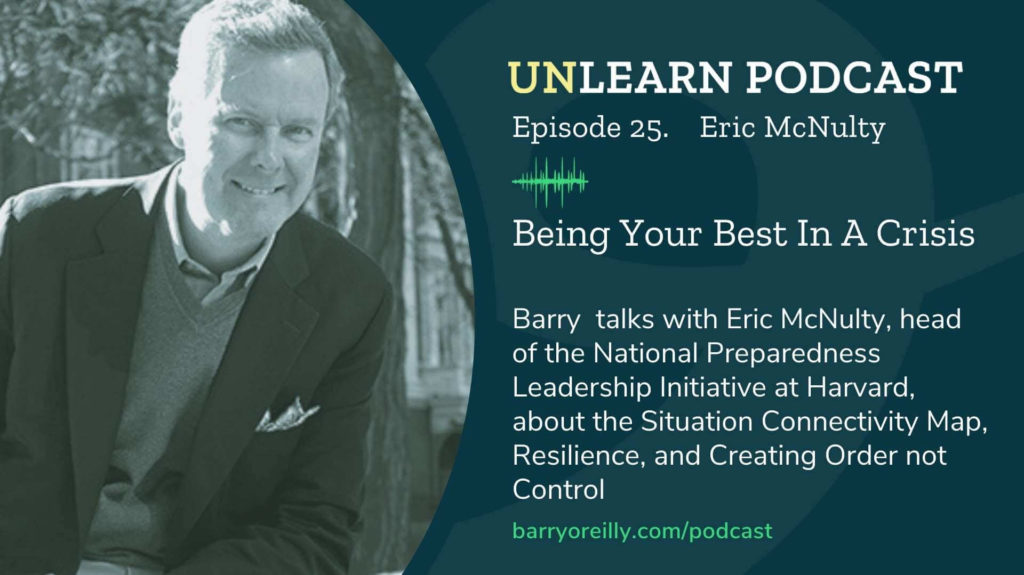This week’s guest on the Unlearn Podcast is Eric McNulty, head of the National Preparedness Leadership Initiative at Harvard. Eric is a crisis leadership expert who has worked on crises such as the Boston Marathon bombing, Hurricane Sandy and Deepwater Horizon, the BP oil spill off the coast of Mexico. He offers valuable insights about making decisions in crisis situations, in light of the Coronavirus pandemic that has gripped the world.
A Helpful Decision-Making Tool
The leaders who respond best to a crisis are those who can weave several disciplines together to see three-dimensional patterns others miss. Such leaders see what’s missing, and can make connections between different domains to come up with a new solution. Host Barry O’Reilly says that it’s important to recognize the effects of your decisions. He asks Eric about tools to discover potential obstacles when implementing decisions during a crisis. Eric says his colleague, Peter Neffenger, created the Situation Connectivity Map for this very purpose. This tool helps you map out secondary situations that may arise, and allows you to connect the dots and get a richer picture of the overall impact. He says, “You think you’re solving for problem X, but around that are different stakeholders, different aspects of that, and the extent you can map them… and to say What’s gonna playoff in this? How are they connected? Who are the stakeholders? Then you begin to really figure out where you need to put your attention.” [Listen from 3:05]

How Can We Be Our Best?
Times of crisis present a real opportunity for businesses to live out their values. It’s also a great time for innovative solutions. Eric shares the story of Liberty Bank and Trust Company who illustrated this concept. Barry comments that you learn a lot about companies and people during these times. He argues that these moments are actually opportunities to strengthen customer relationships, loyalty, and awareness. People remember how you made them feel during trying times, he points out. [Listen from 12:45]
This is a time to be aspirational, Eric says. Your old bureaucratic process will keep you from innovating and actually prevents you from doing right by your customers. Ask yourself, “How can we be at our absolute best right now?” He encourages leaders to make changes, to rise above the situation to come out better and stronger. Barry adds that when you empower people to be their best, you will be amazed by what you can achieve together. Eric shares some interesting stories of resilience and innovation that he saw during crises. [Listen from 15:55]
It’s About Creating Order
In a crisis, Eric says that he is “completely uninhibited about asking stupid questions.” He wants to understand why things are done in a certain way. Sometimes, his questions help others open up to doing things differently. He always asks these questions first:
- Who or what has suffered here? Are they being taken care of?
- Who should we have helping us who’s not here?
He says that failure often happens when you try to control everything. However, the very nature of a crisis is that it’s partly beyond your control. As such, you should aim to create order, not control. You only impose control when it brings more order, he says. He advises leaders to trust their people and delegate as much as possible. That’s how you give yourself space to contemplate the bigger decisions and understand the potential unintended consequences. [Listen from 24:30]
Looking Around the Corner
“If you’re looking around the corner what’s coming next actually is pretty obvious,” Eric says. He gives some practical tips to help leaders look ahead during a crisis:
- Think about what’s likely to happen and the future consequences, based on the evidence you have;
- Micro-journal your decisions and the information that led to them. [Listen from 30:40]















